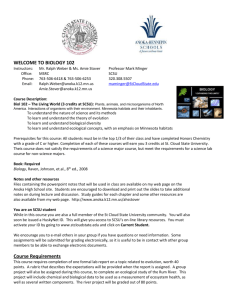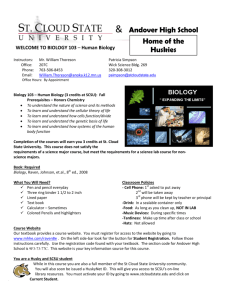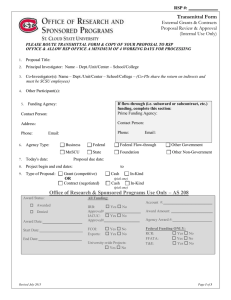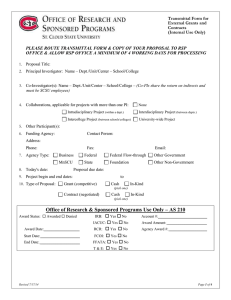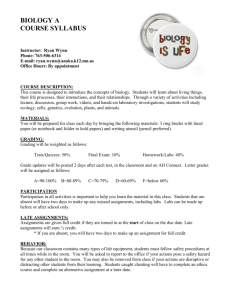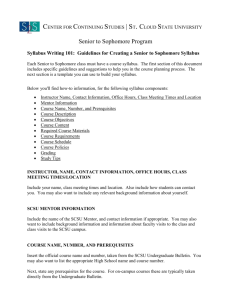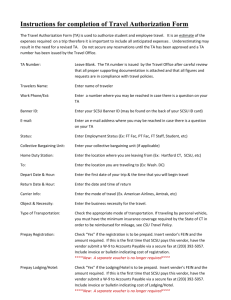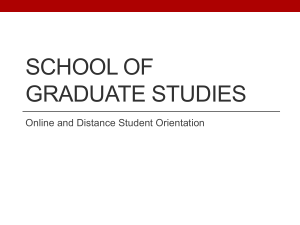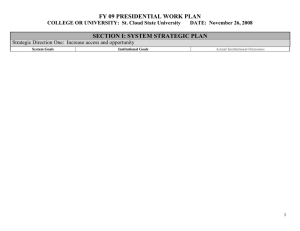welcome to biology 103
advertisement
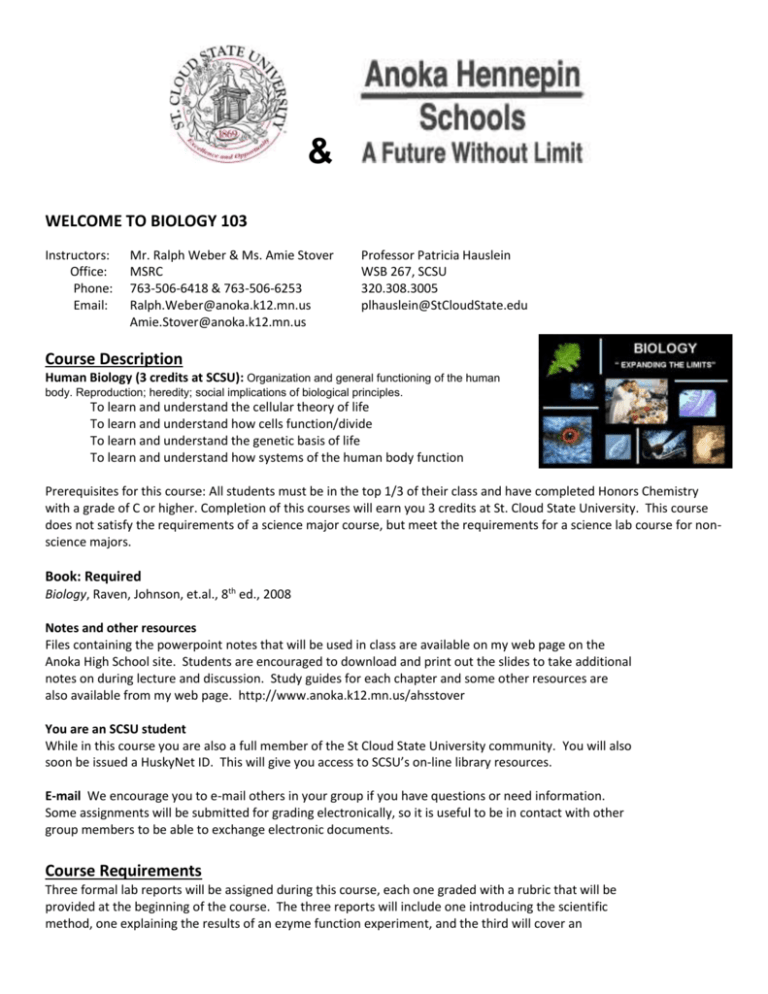
& WELCOME TO BIOLOGY 103 Instructors: Office: Phone: Email: Mr. Ralph Weber & Ms. Amie Stover MSRC 763-506-6418 & 763-506-6253 Ralph.Weber@anoka.k12.mn.us Amie.Stover@anoka.k12.mn.us Professor Patricia Hauslein WSB 267, SCSU 320.308.3005 plhauslein@StCloudState.edu Course Description Human Biology (3 credits at SCSU): Organization and general functioning of the human body. Reproduction; heredity; social implications of biological principles. To learn and understand the cellular theory of life To learn and understand how cells function/divide To learn and understand the genetic basis of life To learn and understand how systems of the human body function Prerequisites for this course: All students must be in the top 1/3 of their class and have completed Honors Chemistry with a grade of C or higher. Completion of this courses will earn you 3 credits at St. Cloud State University. This course does not satisfy the requirements of a science major course, but meet the requirements for a science lab course for nonscience majors. Book: Required Biology, Raven, Johnson, et.al., 8th ed., 2008 Notes and other resources Files containing the powerpoint notes that will be used in class are available on my web page on the Anoka High School site. Students are encouraged to download and print out the slides to take additional notes on during lecture and discussion. Study guides for each chapter and some other resources are also available from my web page. http://www.anoka.k12.mn.us/ahsstover You are an SCSU student While in this course you are also a full member of the St Cloud State University community. You will also soon be issued a HuskyNet ID. This will give you access to SCSU’s on-line library resources. E-mail We encourage you to e-mail others in your group if you have questions or need information. Some assignments will be submitted for grading electronically, so it is useful to be in contact with other group members to be able to exchange electronic documents. Course Requirements Three formal lab reports will be assigned during this course, each one graded with a rubric that will be provided at the beginning of the course. The three reports will include one introducing the scientific method, one explaining the results of an ezyme function experiment, and the third will cover an experiment on cell membrane function. Each report will be graded out of 40 points. College Biology 103 Class Schedule WEEK 1 Unit 1 - The Science of Biology SCSU Registration, Living vs. Nonliving lab, and Seed Germination Experiment Seed Germination Experiment – Formal Lab Report Read Chpt. 1 Unit 1 Test WEEKS 2-5 Unit 2 – Biochemistry, Microscopy and Cell Structure Carbohydrates lab, Protein lab, Lipid lab, Enzyme Lab(at SCSU),Modeling Lab, Microscope lab, and Cell lab Enzyme Lab – Formal Lab Report Read Chpts. 2-4, and 6 Unit 2 Test WEEKS 6-9 Unit 3 –Membranes/Transport, DNA-Protein Synthesis, and Cell Division Beet Membrane Lab, Osmosis Lab, DNA Model, DNA isolation, Online Protein Synthesis Activity, and Onion Mitosis lab Beet Membrane Lab – Formal Lab Report Read Chpts. 5, 10(188-196), 11, 14(P.258-264), and 15(skip sections 15.4 and 15.6) Unit 3 Test WEEKS 10-12 Unit 4 –Genetics Penny Probability Lab, Genetics Problems Packet, Corn Genetics Lab, Sex-Link Bean Lab, Baby Lab, and GATTACA Read Chpts. 12 and 13 Unit 4 Test and Final Test Course Grading Both your High School Grade and your SCSU grade will be based on the following: Tests/Quizzes Labwork/Coursework 60% 40% Grading Scale: A = 93-100% B+ = 87-89.9% C+ = 77-79.9% D+ = 67-69.9% F = Below 60% A- = 90-92.9% B = 83-86.9% C = 73-76.9% D = 63-66.9% B- = 80-82.9% C- = 70-72.9% D- = 60-62.9% Grades will be posted online and updated approximately every two weeks. Cheating/Plagiarism will not be tolerated and could result in a zero for that activity. Cell Phone use during class could be interpreted as cheating and could result in a zero for that activity. Tests: There will be tests throughout the course, approximately 4 unit exams and a final exam. Material on the tests will cover content from class, textbook readings, and class labs/activities. Questions could be a combination of multiple choice, short answer, matching, or essay. Labs: Lab is a key component of this course and is assessed with formal lab reports. There will be 3-4 of these assigned to your lab group each quarter. Detailed requirements for each lab report will accompany each activity. Major labs can be made up by arrangement with the instructor. Other Assignments: Expect to have regular homework assignments, including guided reading from the textbook, discussion questions following lab investigations, articles related to our current material, and practice problems. As a college student, you are expected to keep up with these assignments, however not all of them will be collected for a grade. Questions referring to these assignments may appear on tests. Course Policies Late Policy: 50% for one day late 25% for more than one day late. Academic Honesty : As a reminder, SCSU and Anoka High School have a policy on academic honesty. You are expected to abide by the procedures set forth in the SCSU Student Handbook. See: http://www.stcloudstate.edu/studenthandbook/policies/academic.asp for specifics. Accommodating Disabilities: Any student in this course who has a documented disability that may prevent him or her from fully demonstrating his or her abilities should contact me personally as soon possible, so we can discuss accommodations necessary to ensure full participation and facilitate your educational opportunity. Characteristics of College vs. High School Situation High School College Time Management Your time is structured by others (parents and/or teachers). You manage your own time. Personal Responsibility You are usually told what your responsibilities are and corrected if your behavior is out of line. You are now responsible for what you do and what you don't do, as well as for the consequences of your decisions. Lectures Teachers often write information on the board to be copied into your notes. Professors may lecture nonstop, expecting you to identify the important points in your notes. When professors write on the board it may be to amplify the lecture, not to summarize it. Good notes, and, therefore, good attendance, is essential. Outside of class studying You may study outside of class as little as 0 to 2 hours a week. You need to study at least 2 to 3 hours outside of class for every hour in class. This will translate to 15 – 20 hrs a week in our college course Additional assignments You are expected to read short assignments that are then discussed, and often re-taught, in class. You are assigned substantial amounts of reading and writing that you are expected to know, but may not be directly addressed in class. Characteristics of College vs. High School Grades "Effort counts." Courses are usually structured to reward a "good faith effort" or homework and worksheets make up a big part of the grade. . "Results count." Though "good faith effort" is important in regard to the professor's willingness to help you achieve good results, in the grading process, it will not substitute for test results
